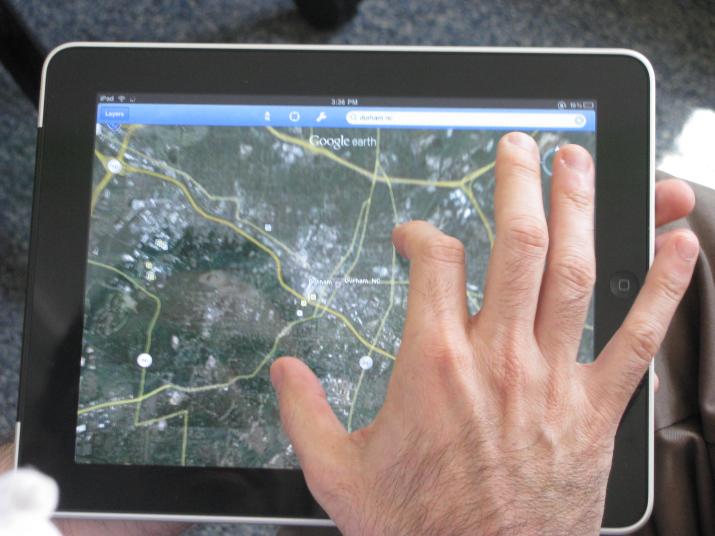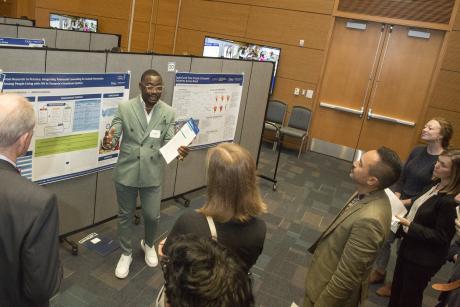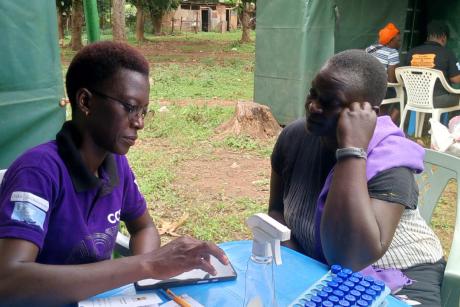
The iPads will be equipped with apps for mapping, data collection and communication.
Published July 2, 2010, last updated on June 3, 2020 under Education News
The Duke Global Health Institute is set to begin an innovative pilot program that incorporates the use of the new Apple iPad tablet in student field research. With funding from the Duke Center for Instructional Technology (CIT), DGHI is one of the first units on campus to use this technology as a teaching and field research tool.
This fall, iPads will be distributed in “Research Methods in Global Health Sciences II,” a course in DGHI’s Master of Science in Global Health (MSc-GH) degree program, which is taught by DGHI member and sociologist Jen’nan Read. The course introduces students to a range of methodological techniques used in global health research, including qualitative field research, quantitative survey research, evaluations, and interventions.
“Our primary goal is to equip our students with the tools that allow them to make the most of their time in the field,” said Read. “As calculation, graphing, and presentation-creation functions of the iPad are put to use in the field, so too is the ability for students to focus on mastering the more complex methods by which they are basing their research.”
Read says iPads will increase research efficiency in the field by allowing students in low-resource settings to capture more data using one device than the traditional methods of data collection. The small, lightweight, touch-screen mobile computing device is equipped with 3G and Wi-Fi internet access and a variety of research and survey applications that can record and import multimedia interviews and photos, and collect, chart, evaluate, and even present data. The device has a 10-hour battery life and as surveys and interviews may be conducted in dusty environments that do not offer a place to sit or rest a laptop or netbook, the slate form factor of the iPad is easy to handle and less susceptible to damage.
“Traditionally, the more sophisticated learning, the kind that requires synthesis and evaluation, occurs after the students have left the field, after they have completed data entry, and only after they have begun to organize, interpret, compare and contrast, and summarize their data by retiring to a location with a laptop or desktop computer, like their home or office,” said Marc Sperber, DGHI Educational Technologies Consultant and the main consultant for this project. “With an iPad, a student may collect, organize and display data while in the field, allowing them to immediately engage in analyzing and interpreting that data when and where it has greatest meaning.”
MSc-GH students will be trained on the device and given a local fieldwork assignment to practice using the iPads, with the goal of preparing them for the limitations they will encounter when working in a remote, low-resource setting as part of their global health research project in summer 2011.
“The iPad opens up many new possibilities for fieldwork researchers. We are hopeful we will be able to expand this pilot project as technology continues to improve,” said Read. “When used in conjunction with other technology, such as the flip camera and laptops, the iPad has the potential to help revolutionize how we work in the field.”
The project is part of a larger movement at Duke to integrate technology with education. CIT Assistant Director Amy Campbell said there is growing interest in the iPad, as evidenced by the high volume of requests to participate in the CIT iPad loaner program. There are also a variety of Duke projects both under way and being considered that incorporate the use of Flip cameras, cell phones as “clickers” to record student responses in class and e-readers like the Kindle. The Duke Medical Center Library, for example, is currently working to expand a project that makes clinical reference tools and practice guidelines readily available on Kindles for medical student clinicians. For more information on that project, contact .


